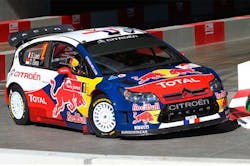Based in Strasbourg close to the border with Germany, the bulk of the event's 20 special stages are contained within hilly forest areas with the exception of Sunday's runs: a 24-kilometer test through the Bitche Camp military training area, and a 4.10-kilometer blast through Haguenau, Sebastien Loeb's home town.
Loeb - who can land his seventh world title by winning the event - is expected to dominate in his Citroen C4 World Rally Car. An established asphalt specialist, the last time Loeb was defeated on a pure tarmac event was in Spain in October 2004 when he retired due to a mechanical problem.
"We saw in Bulgaria in the summer - a new rally for everybody - that Sebastien was a little bit ahead of everybody," said Sven Smeets, team manager of the Citroen factory squad. "We really expect him to be up front fighting for the victory in France where he can bring the championship home. There will probably be a little bit of pressure because it's his home town and people expect him to win but we know his skills on tarmac and Sebastien is never really under pressure."
Pirelli is the official tire supplier of the WRC under a three-year agreement with the FIA - motorsport's world governing body. The Italian tire company will supply the hard and soft compound variant of its P Zero tire to all crews in four-wheel drive machinery. The hard compound is designed for hot and dry conditions with the soft version better suited for cooler temperatures and a damp stage surface.
Matteo Braga, Pirelli's senior WRC tire engineer, says he expects tire compound choice to have an impact on the final result.
"Although we expect Sebastien Loeb will be world champion, we know that the weather will be less easy to predict and this will influence the choice of tire compound," said Braga. "We have seen that the soft compound P Zero tire works well in warm and dry conditions, but in France, there is a chance of some rain so it's likely we will see more soft compound tires being used on this event. The quantities available have been selected with rain in mind so there is no problem with supply, the only concern is if it rains very hard, which it can do in the mountains."
The tire regulations set out by the FIA don't allow for a specific 'rain' tire, nor do they allow the insertion of artificial 'cuts' into the tread pattern to provide extra grip. The measures were all designed to ensure the tire could be used on a wide variety of asphalt and in different conditions to ultimately control costs. "It means drivers will face a compromise if it rains and maybe won't be able to push at 100 percent," continued Braga.
As with all rallies using mountainous stages, there is a constant risk of changeable weather conditions and localized precipitation. But even if it doesn't rain, the stage surface is likely to be slippery in places according to George Black, the Ford team's tire technician.
Black has driven over the competitive route and described the problem of stage "pollution", adding: "Because the rally is mainly in forest areas you have a problem of pollution with pine needles and leaves falling like snow on the road. It puts moisture on the ground and with the temperature quite cool in the morning it's going to be quite a challenge. Apart from the Bitche Camp stage, no stage on the rally has one consistent surface, (it is) smooth, coarse and bumpy tarmac, even gravel in some places. It will compromise car set-up and make for a difficult rally."
Black also pointed to the variation in stage width as being another factor on the event and singled out Friday's 24.5-kilometer Grand Ballon stage, which reaches a peak of 1424 meters. "You've got single-width tracks and then when you approach the ski resort the road is very wide so you can straight-line lots of the corners. Then it's narrow again through the trees and bumpy. You will also have a big variation in temperature from start to finish."
P1 and P2 drivers can select from a quantity of 24 hard compound P Zero tires and 22 soft compound P Zero covers on Rallye de France. However, they cannot exceed 36 tires for the entire event. All other four-wheel drive crews can select from 20 hard compound tires and 16 soft compound tires but are restricted to a total of 25 for the duration of the rally. Crews in the Junior World Rally Championship will use the RX tire, available in 16- and 17-inch diameter.
Latest in Retail
Latest in Retail



